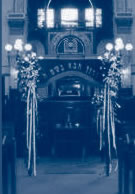|
SEDRA : Behukotai Hertz Chumash p. 542
Leviticus Chap. 26
This week's Sedra is generously sponsored by Paul Ramler.
SYNOPSIS:
Having declared the ideals of Holiness, the Torah now sets
out the blessings that result from faithfulness to G-d and
His commands and contrasts these with the disasters which
are the fruits of faithlessness and defiance.
Adherence to the laws of the Torah will bring blessing and
prosperity for the people. The land will yield abundant produce
and the farmers will be gainfully occupied throughout the
year. G-d's blessings and protection will lead to a feeling
of security, peace will reign and the people will be content.
"And I shall be your G-d, and you shall be My people".
(26 : 12).
However, resistance to G-d's laws will lead to catastrophe.
The details of the results of rebellion and defiance are arranged
in a series of five groups growing in severity : sickness
and defeat, famine, wild beasts, siege and exile. Nevertheless,
G-d will never totally reject His people. Repentance will
cause G-d to remember His covenant with His people and will
restore them to their land.
Provisions for those who have made a vow to contribute to
the needs of the Sanctuary are discussed. A scale of amounts
varying according to sex and age is provided for one who wishes
to dedicate the ascribed value (erech). Once a kosher animal
has been dedicated as a sacrifice another animal cannot be
substituted for it. If the animal is blemished it can be redeemed
by paying its value plus a fifth to the Kohen.
Land that was dedicated to the Sanctuary may be redeemed by
calculating its value based on the years remaining to the
next Yovel. A firstling (B'chor) cannot be dedicated since
it is already the property of G-d. Tithes of agricultural
products can be redeemed by paying the capital value plus
a fifth but a tithe of new born animals could never be redeemed.
HAPHTORAH HERTZ CHUMASH P.551 Jeremiah Chap 16 : 19
The Sedra speaks of the disasters which will be visited upon
the Jewish people if they defy G-d. Jeremiah was a witness
to the destruction of the Temple and the exile of his people.
Here Jeremiah, acknowledging their punishment and low state,
nevertheless preaches a message that : "G-d is the Hope
of Israel" (17 : 14) if only Israel would turn to G-d
and ask to be healed and saved.
TELL ME RABBI ..... SYNAGOGUE ETIQUETTE, CORRECTNESS AND
PROPRIETY
Appropriate Dress I could hardly imagine a Jew who does not
know that it is appropriate to have his head covered in Synagogue
as a traditional sign of respect for G-d. Our sages declare:"Cover
your head so that the reverence for G-d be upon you"
(Shabbat 156b) It is customary for married women to cover
their hair during prayer.
General dress depends upon custom and it would be fair to
say that smart casual has become the minimum standard. There
are, however, certain minimum rules which always apply. Certain
parts of the body are always required to be covered: shoulders
and the area close to the neck, upper arms from above the
elbows, and legs from the knees up. This precludes the wearing
of mini skirts, sleeveless, low-cut and bare-back garments.
Shorts for men and women as well as unshod feet are inappropriate.
It is considered inappropriate for women to wear slacks for
Shul and certainly not the various assortments of leggings
and tight fitting slacks which are very popular at present.
The latest fashions may be suitable for festive and social
occasions, but are not always appropriate for Synagogue. Good
taste, common sense and modest attire are the rule.
General Behaviour
Smoking (even on weekdays), eating, chewing gum or behaving
in a frivolous manner are not permitted in a Synagogue. Mobile
phones are a "no no".
Speaking is always very strictly limited during Services and
is absolutely forbidden for extended periods at certain times.
Such times include: While the Torah is being read, from Bar'chu
till after the silent Amidah (evening and morning services)
there must be no conversation, only minor interruptions for
essential matters are permitted in between the sections of
the prayers.
The Chazan repeats the Amidah for Shacharit and Mussaph for
the benefit of the Congregation, especially those people who
are unable to read Hebrew, and it is not the time for conversations
or for people to walk around the synagogue. Except for Shammashim
and congregational officials, walking around the Synagogue
is inappropriate and disrupts the devotional dignity and decorum
of the Synagogue service.
The purpose of the mechitzah is to preclude the mingling and
socializing of the sexes during prayer. In addition to one
not being permitted to walk around during services, going
up to the mechitzah to converse or greet the ladies compounds
the situation.
When entering Synagogue
Bring the appropriate book, a Siddur, Machzor or Chumash with
you from the shelf. Enter your seat with minimum disturbance
to other worshippers. If the person/s in your row are quietly
standing during the Amidah trying to force yourself past them
is regarded as rude. If you enter during Kedushah you must
stop wherever you are, stand at attention and respond appropriately
to the Chazan.
It is not appropriate to make a long ebullient greeting, but
in our congregation a brief, quietly spoken greeting with
a warm smile would do. The practise of guests entering the
Synagogue for Bar Mitzvahs and Aufruffs making a big fuss
by approaching the celebrating family in a loud and gung ho
fashion is singularly inappropriate. Kissing within the sanctuary
of the Synagogue is discouraged since our devotion in this
Holy place should be to G-d alone.
Where a visitor to our Synagogue is found sitting in the permanent
seat of a member who has just arrived, courtesy and understanding
is the order of the day for the member and for the visitor.
Children in Shule
The presence of children in synagogue enlivens and adds to
the atmosphere of joy. Children ought to be encouraged to
attend services and parents should take reponsibility for
them utilizing the occasion to imbue with with love for the
service and guiding them towards appropriate behaviour in
Synagogue.
Whilst much of appropriate Synagogue behaviour could easily
be governed by good manners, good taste and common sense,
there are some aspects which differ from conventional expectations
and these ought to be guarded against. In our congregation
we strive to be "worshipper-friendly".
We try to achieve a balance between the two words- as worshippers
we should always "know before whom you stand" while
at the same time maintaining a warmth and friendliness which
builds on the phrase - all Israel are friends- enabling us
to AServe the Lord with Joy.
PRAYER FOR THE NEW MONTH
This prayer, opening with what was originally the private
intercession of the Talmudic Sage Rav, at the end of the daily
Amidah, contains another unique feature. In pleading for the
ingathering of our exiles from the four corners of the earth
there occurs the sole usage in the prayer book of the well-known
phrase Chaverim Kol Yisrael ("All Israel are members
of one united fellowship"), a phrase itself derived in
the Jerusalem Talmud from the verse "Jerusalem is built
as a city which is united (shechubrah) together" (Ps
122:3) - that is, "a city which makes all Israel into
Chaverim".
The phrase may well be an allusion to the hope of reverting
from the present calculation of the Jewish calendar introduced
by Hillel (the second) early in the 4th century to its previous
determination by observing the moon's phases. The change can
only be effected in Jerusalem on the restoration of the Sanhedrin
and its proclamation of Rosh Chodesh, which in turn depends
on all scholars in the Holy Land being "united"
as Chaverim in re-establishing the ancient line of rabbinic
authority (Maimonides). (Singer's Siddur 1990 ed.)
BACK TO SHABBAT SHALOM
TABLE
|








